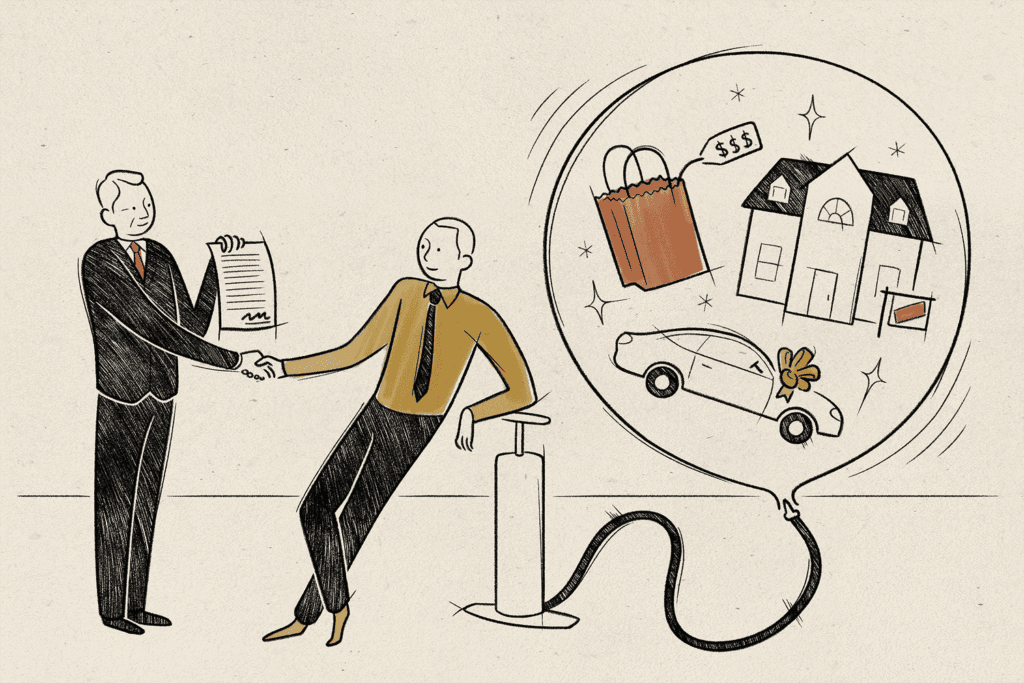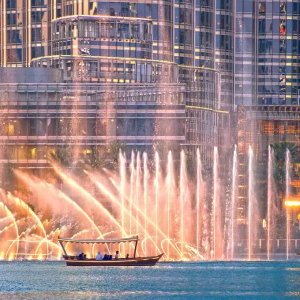Dubai — the shimmering jewel of the Middle East, where luxury cars line the streets, towering skyscrapers touch the clouds, and weekends are spent brunching in style. It’s a city known for its promise of prosperity, tax-free salaries, and endless opportunities for growth. But beneath the glitz and glamour lies a financial phenomenon that most expats and residents quietly experience but rarely discuss openly: lifestyle inflation.
It’s a silent, creeping shift that affects thousands of people moving to and living in Dubai. One day you’re excited about your new job offer, and before you know it, you’re chasing a lifestyle that constantly seems a step ahead of your paycheck. In this article, we’re diving deep into this unspoken reality, why it happens, how it impacts people, and most importantly — how you can break free without giving up on your dreams.
What Exactly Is Lifestyle Inflation?

Lifestyle inflation happens when your spending increases as your income rises. The more you earn, the more you start upgrading your life — better apartment, fancier car, more holidays, pricier clothes, and top-tier gadgets. While treating yourself isn’t a bad thing, the problem arises when it becomes a habit rather than a reward.
In a city like Dubai, this happens faster and more aggressively than in many other parts of the world. Why? Because in Dubai, luxury is normalized. It’s not uncommon for your colleague to drive a sports car, for your friend to live in a waterfront apartment, or for acquaintances to travel first-class every other month. The pressure to keep up is subtle but constant.


Why Lifestyle Inflation Happens So Fast in Dubai
There are a few key reasons why lifestyle inflation is particularly rampant in Dubai:
1. The Tax-Free Salary Illusion
The absence of income tax feels like an instant financial upgrade when you first arrive in the UAE. Suddenly, your entire salary is yours to spend, and without proper budgeting, it’s easy to fall into the trap of spending more just because you can.
Many people feel wealthier than they actually are because their bank account looks fuller. But when rent, bills, entertainment, and personal expenses in a premium-priced city kick in, that illusion fades quickly.
2. Social Media Pressure and the ‘Soft Flex’ Culture
Dubai is one of the most social-media-driven cities in the world. Influencers, expats, and even regular residents often showcase their lives online — be it dining at five-star restaurants, vacationing in the Maldives, or upgrading to the latest iPhone.
While it may seem harmless, constantly viewing curated lifestyles can unknowingly push you to spend beyond your means. You start comparing your ordinary day to someone else’s highlight reel, and the urge to ‘keep up’ begins.
3. Peer Influence and Competitive Living
Your social circle heavily influences your financial decisions. If your friends regularly go out to expensive brunches, book staycations, or drive luxury vehicles, chances are you’ll feel compelled to do the same.
In Dubai, where networking is as much a social activity as it is a professional one, saying ‘no’ to these experiences can sometimes feel like social suicide. So, people quietly swipe their cards, convincing themselves it’s just this one time — until it becomes routine.
4. Easy Access to Credit and Installments
From buy-now-pay-later plans to easy credit card approvals and car financing, Dubai makes it tempting to live a lifestyle you technically can’t afford. It’s common for people to fund designer purchases or holidays through credit, silently accumulating debt while appearing affluent.
Over time, those monthly payments stack up, leaving many trapped in a paycheck-to-paycheck cycle despite earning well.
The Emotional Cost of Lifestyle Inflation
While the financial implications are evident, what most people don’t discuss is the emotional and mental toll. Constantly striving to match or outdo others can lead to stress, anxiety, and dissatisfaction.
Many expats in Dubai privately admit to feeling overwhelmed by the constant pressure to upgrade — better jobs, better homes, better holidays. It creates a vicious cycle of working harder, earning more, and spending faster, leaving little room for genuine financial security or personal peace.

How Lifestyle Inflation Impacts Long-Term Financial Goals
One of the biggest dangers of lifestyle inflation is that it quietly eats away at your ability to build wealth. The more you earn and the more you spend, the less you save and invest.
Common long-term goals affected include:
- Retirement planning
- Saving for property back home
- Emergency funds
- Education funds for children
- Starting a business or side hustle
Many people spend years in Dubai earning well but leave with little to show for it financially because their lifestyle inflated as quickly as their income.
How to Break Free from the Dubai Lifestyle Trap
The good news? You can enjoy Dubai’s incredible offerings without falling into the lifestyle inflation trap. It requires a conscious shift in mindset and some practical strategies.
1. Know Your ‘Why’
Before you increase your expenses, ask yourself: Why am I upgrading? Is it for personal satisfaction, genuine need, or external validation?
When your decisions align with your personal goals rather than societal expectations, it becomes easier to resist unnecessary expenses.
2. Set Non-Negotiable Savings Goals
Treat your savings like a bill that must be paid first every month. Whether it’s 20%, 30%, or even 10% of your salary, automate it into a separate account you don’t touch.
Having clear financial goals — like buying a property, traveling debt-free, or early retirement — gives you a reason to prioritize saving over impulse spending.
3. Surround Yourself with Financially Conscious People
Find a social circle or online community that values financial literacy and conscious living. Being around people who prioritize saving, investing, and mindful spending can normalize healthier financial habits.
You’ll realize you’re not alone in choosing a budget-friendly café over an overpriced brunch or skipping a designer sale for a weekend hike.
4. Practice the 24-Hour Rule
Whenever you feel the urge to make a big purchase, wait 24 hours. This pause often reduces impulsive buying and gives you time to assess whether the item adds real value to your life.
5. Track Your Spending
It’s impossible to fix what you don’t measure. Use budgeting apps or even a simple spreadsheet to track every dirham you spend. Patterns will emerge, showing you where your money is going and where you can cut back without sacrificing happiness.

Why It’s Okay to Say ‘No’ in Dubai
One of the most powerful lessons expats eventually learn is that it’s okay to say ‘no’ — to lavish brunches, spontaneous trips, or buying the latest luxury gadget.
You don’t need to match anyone’s pace but your own. Financial freedom comes not from how much you earn but from how wisely you manage it. In a city like Dubai, where the opportunities are limitless but so are the expenses, mastering this balance is the real win.
Final Thoughts
Dubai offers a lifestyle unlike any other, but it comes with unspoken pressures that can lead even the most financially responsible people astray. Lifestyle inflation is real, and while it’s easy to get caught up in the city’s dazzling pace, it’s entirely possible to build a fulfilling, financially secure life here without losing yourself in the process.
The secret lies in knowing what you truly value, setting clear financial boundaries, and being courageous enough to live life on your own terms — not Instagram’s, not your colleagues’, and not your neighbor’s.
After all, in a city that shines so bright, it’s those who stay grounded who end up thriving the longest.
Do follow UAE Stories on Instagram
Why Your Salary Isn’t Enough — and What to Do About It in Dubai













